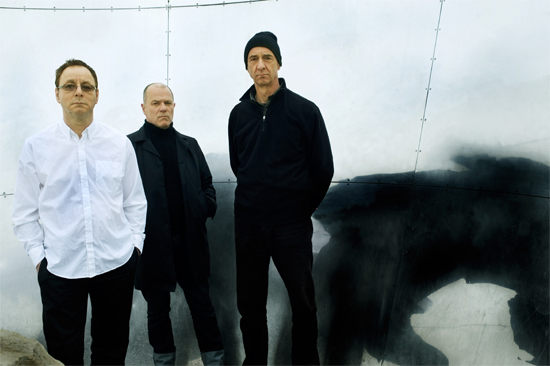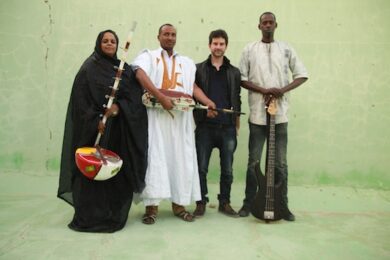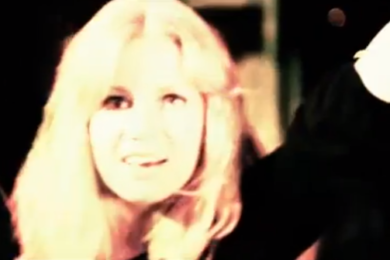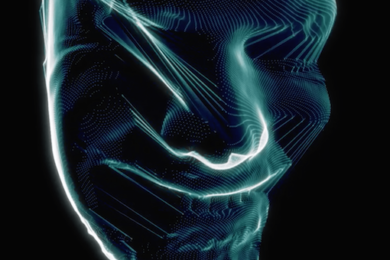December 7th, 2010. London is simultaneously frozen solid and teeming. Miniature goings on masked by the stillness of the landscape, the grandness of the sky, every shade of off-white you could imagine. It is a very Wire-like day on the South Bank, very 154 to be exact; the cover to the band’s third album could have been an abstract, reductionist interpretation of the current setting, turning the shapes and tones of this cultural centre into blocks of pure colour. The bus here – the 243, incidentally – felt like it was propelled by ‘The 15th’.
With their new album Red Barked Tree, Wire have regained the glacial, psychedelic pop that they invented. Freeze-frame montages made from well-fused fragments, an absurdist collage that feels very much like the London that currently exists around us, or at least is filtered through to us; events arriving at our acknowledgement though layers of technology. We are told things – incomprehensible things – are happening, but they remain out of reach under a still surface.
The band was born around Watford Art College in 1976. Last night students had staged a protest against the cuts to arts funding. Two days later, images appeared via tweeted links appeared on desktops as a day of dissent unfolded on December 9th: fireballs in front of Big Ben, Camilla’s addled expression. Today, across the river, Big Ben is a frozen thermometer and Colin Newman, Graham Lewis and Robert Gotobed – the three original members of Wire, after the fourth, Bruce Gilbert, left in 2004 – are sitting in the Royal Festival Hall foyer. It is a fitting place to meet the UK’s premier "art-rock" band, though Wire have shown, all along, that the term should not be so strange or even that necessary.
Wire are a group who, through cultural habit, must be judged by their own music history, in particular the incomparable abstract pop albums Chairs Missing and 154. This makes it all the more gratifying to know that Red Barked Tree does not suffer from comparison. It works for a whole new today (a today that is, unsurprisingly, not that whole, nor that new) and sees Wire back making the pop songs of the type not heard since ‘Outdoor Miner’, ‘I Am The Fly’ or ‘The 15th’. ‘Clay’ is a Wire archetype (a smoother update of ‘I Am The Fly’); ‘Bad Worn Thing’ manoeuvres from British railway grumbles to a confrontation with confrontation itself.’Now Was’ addresses in a roundabout, Wire-like way the impossibility of making statements in an environment that could be said to be suffering from utterance-overload ("Ledges sound hollow/Which promise tomorrows/They float to the floor/Forming lakes of dead skin"). ‘Adapt’ is floating pop purity: ‘Red Barked Tree’ gets close to "the soul" of Wire.
Behind us, throughout the interview, are a group of children, shouting, running, jumping about, enjoying the abundant space in the Royal Festival Hall. Some of the kid’s shrieking was reminiscent of a few weeks previously, at the 200-capacity Lexington near Angel, north London, where Wire had played in a two-night show for The Quietus in November, where one or two fans screamed garbled obscenities…
At the first night of the Quietus gig I noticed there was a very small but vocal minority in the crowd who seemed like they must come to most of your gigs to get really pissed and practice abstract heckles.
Colin Newman: Yeah some of those were a bit stupid.
Graham Lewis: There were quite a few apologies afterwards.
CN: There was one person who was being kind of annoying until he was spoken to by some of our friends. But there are a few of our fans in various places who are really, really good at abstract heckling. And a good abstract heckle that makes you laugh when you’re on stage is a perk of the job really.
GL: The one who was particularly pissed and most vocal apologised the second night and said it’s just that he gets very nervous on the first night – he gets very nervous on the first night. He was rather quieter on the second night. I said to him, maybe just wait until the second night next time.
I was reading the notes that came with the new album, where you have a conversation about each song and there was a line about the arrogance of cynical old men, in relation to the song ‘Now Was’. It just made me think of these fans who have followed you for years but who are heckling you.
CN: The thing is we allow the space for people to shout things and then we will respond: if it’s funny, we’ll laugh, if it’s not funny we’ll tell them to fuck off. We don’t behave in any way that is particularly different to the people in the audience. We are somewhat less drunk than some of the audience members but I don’t really feel like we are doing the performance to a vacuum – it’s very visceral, to see Wire in a small club, that’s the place to see it. You are lucky to see it in that kind of space because normally economics dictate we can’t normally play in places that small, especially not in London – we always play much bigger shows because more people wanna come. But it is fantastic when the sound is super intense like that, in your face and right there. It’s confrontational, but there is not a design of confrontation, it is just the nature of material. There’s no real active design, it is just how the material is; this is how we present it, we go for it because we want to put it across strongly.
And it feels like the way you play and record is not your decision any more. Like the sound of Wire is the sound of something that pre-exists, that is bigger than the choices you make.
GL: Well that’s the whole idea of having a group, the collaboration; you can’t make that noise on your own. It doesn’t work. The idea is when you have three or four different points of view is exciting. It works in a way which we can’t explain. We don’t really want to know why because then you wouldn’t need to do it any more probably. It is just this extreme elevation you get from it. It produces an energy that you enjoy. I guess otherwise you wouldn’t be doing it.
CN: There is something in the core arrangements… I have no idea why Rob would play a certain rhythm, no idea at all. Do you know, Rob?
Robert Grey: Well, I try and play something that fits.
CN: The one I’m always trying to deconstruct now is ‘Now Was’, because each individual voice is so different…
GL: That’s the one that is about the cynical old men being twats.
CN: What made Rob go for that boom-cha? And what made Graham go for that bass? The arrangement was over in two minutes. It wasn’t as if anyone spent any time thinking about it – they just did it. It is something that is revealed in a more pure form on this record than it has been on any Wire record for a very long time. Simply because of the nature of how we went about it. You say, ‘Here’s the starting point, let’s see how everybody interfaces with that’.
Which is very different from the way you had been recording in the couple of albums that preceded it.
CN: Completely different. Send and Object 47, although they are totally different sounding records that were made in exactly the same way – on both, it is all pretty much cut and paste. The cut and paste elements on Object 47 are somewhat more refined and we actually recorded the drums in the studio as opposed to in a rehearsal room as on Send. In hindsight, I don’t really like that sound so much but it was perfect for a moment in time.
GL: And it certainly added to the colour that the record has got didn’t it.
CN: Oh absolutely but ‘Two Minutes’ [on Red Barked Tree] is like Send done right. It has got the same kind of aesthetic as Send but you’ve got drums recorded in a real room that has got stuff set up to record it with. Just the way it lifts with a real drum kit. It sounds like there are people inhabiting it.
GL: Whereas the thing that is wonderful about Send is it sounds like there aren’t any people there. Occasionally you hear people shouting, trying to get out. But it doesn’t sound like people.
So, the way you recorded Red Barked Tree closer to the way you recorded Chairs Missing or 154?
GL: Yeah.
CN: It’s closer, but it’s much more compacted. What we used to do back in the day was I would come to the rehearsal room with a song. I used to have a drawer full of lyrics, and Graham and Bruce would sometimes chip in as well. We’d rehearse what I’d brought, play some gigs and when we had enough material we’d do some demos and then we’d go and do an album. So that material by the time we got to the studio was pretty well honed as we played everything before we recorded it. It is actually a totally sensible way of going about things. We all thought we were being really radical. ‘They’ve dropped the current album and they’re playing the next one!’ people would say. Well yeah, we’ve got all this new material we really like and we wanna get really good at it because we want to get on with our next album…
GL: Isn’t that what you are supposed to do?
CN: This time we compressed it into a very small [space of time]. There were written pieces. We’d do maybe do two or three takes maximum – that was the basis for the record. And obviously there is a great deal of post-production or whatever but the core arrangements don’t change, that’s the core of it and that is the same as Chairs Missing or 154, they are grouped around core arrangements to which things are added. But that core arrangement is the dynamic of the piece originally and that is what holds it together.

Naming the album, did you feel that ‘Red Barked Tree’ was the defining song in terms of lyrical ideas and the way it stands out?
CN: The title for the previous album was really hard work, but when we were thinking about this one I felt strongly we should call it Red Barked Tree. Because it is singular, like Pink Flag it is a thing but Red Barked Tree has all these other connotations to it. I don’t necessarily read all of Graham’s text directly and follow every word, and derive the meaning that he derives from it, but I felt the piece was about the artistic quest for the elixir of life, a substance that will make everything work a little bit better – both a substance and a search for that substance. What we have been trying to do, especially since Bruce left, is figure out how we do this band. And the search for the Red Barked Tree is a poetic way of talking about that. If you go back to Send, our first record of the millennium, it is anti-lyrical. It’s brutal in its reductionism. It is not necessarily minimalist, it’s reduced. Whereas ‘Red Barked Tree’ allows a certain more lyricism, a poetic view, a bit of license and space about what it is you are listening to: how are you engaging with it and what are they saying? They are saying stuff but I am not really sure what they are saying. It is not obvious, it’s not banners or proclamations. It kind of deals with an emotional hinterland, which is more like the one that people actually live in. People don’t necessarily know what they feel about anything really. They feel a number of things and don’t define those things very well. Do you want art to tell you how to be, how to live, what to feel? Or do you want an art which lives in the same world that you live. That is how I feel about it – it’s a very personal view of it – but that is how I feel about this record as well. It’s got something about it that captures the soul of Wire that I don’t think anything has for a very long time. And that soul is not something that is very easily defined.
It has the classic Wire traits; lyricism for the sake of its own beauty, narratives that switch and never quite get there. Fragments of what life is.
GL: Exactly.
CN: In a way poetry is a way of cutting up words to encourage greater reading. Where you can have something that is plain text, it’s instructional, narrative or whatever, but then poetry engages, it gives you more than one way to read it.
GL: There’s always a certain elusive quality to good work because that is what allows you to keep coming back to something, and re-reading it, because actually what you are doing is making a rereading of yourself, and that is the kind of work that I like. When I wrote ‘Red Barked Tree’ I remember thinking, ‘God that is so like how I felt when I wrote ‘Pink Flag’,’ but I didn’t say anything because I thought I might be wrong by pointing it out. It was so funny when Colin sent me this email saying, ‘I really think the album should be called Red Barked Tree,’ and I said, ‘I’m glad you said that because that’s what I’d thought.’
CN: There was almost a feeling we were going to go into a protracted process of discussion about what the title is gonna be and then we are gonna try to find a cover to go with the title.
GL: It took us three fucking months for Object 47. We made the record faster. We were going up the wall.
CN: I thought, ‘Hang on, we can cut to the quick here’. It just seemed to me to be a central thing within the record, and a feeling…

GL: It was great was getting Jon Wozencroft to do the cover image. He originally wanted to use something of his own, but remembered the arte povera artist, Jannis Kounellis’s work which he’d taken a photograph of, which is what the cover is. ‘Because I knew then it completely fulfilled the idea of alchemy,’ Jon said. It’s not illustrative of a red barked tree but it is illustrative of a feeling and an idea, a quest for knowledge basically which is what alchemy is, turning shit into gold, or, more importantly, turning gold into shit. So we knew we were right, when you get that reflection, that triangulation of different artist’s point of view.
It is almost trying to find out why you all keep your artistic quests alive, individually and as a band.
GL: That is what you do as an artist. It’s why you work on projects. There was one other aspect that I thought about – this whole thing with the sea level rising continually as it is and the exploitation of the natural resources we have, one feels that there are all these resources in the world that we haven’t even discovered yet, which may actually be the things that are the solution to the problems that we perceive we have already, but might just disappear. The medicine that will cure cancer will probably disappear in a puddle of water somewhere.
I wanted to talk about the People in a Room gigs at the Jeannetta Cochrane Theatre in 1979, where you all played solo sets and then as a band at the end.
CN: We just literally this week released the one existing recording of one of those nights in our illegal bootleg series, which is kind of fascinating as a thing. Obviously you don’t get the four opening pieces, just the Wire set. In terms of where we were at that point because there is a set of material – by that point we were virtually playing nothing off of 154.
GL: Which had just been released…
CN: We had a bunch of very, very strong material which never got properly realised. Those gigs are almost mythical – like the Red Barked Trees really, trying to find the best quality recording that we could put out. It was a labour of fucking love, believe me. It took a really long time and I still wasn’t convinced even a month ago that we had the best one. I was really nagging the guy who was helping me put it together to find a better one. In the end the one I actually had was better than the one he had given me. I think, quite possibly, the original of that tape doesn’t exist anymore. As a moment in time, if you consider that the band was in much disarray – we’d just done 154 but we’d also done this big tour supporting Roxy Music which was absolutely horrible; Roxy Music in 1974 were fantastic, but Roxy Music in 1979 were Bryan Ferry’s backing band. We were like, ‘Well, is that what is next for us?’ I mean, there was nobody to tell us any different. We still had no money when we got back and it was the middle of winter. It was miserable. We decided we wouldn’t tour any more, and then EMI wouldn’t give us another advance for the next album. We basically had zero money but we still had a pile of new material, which was every bit as thought out and worked on as 154, and the only place you can hear it is on a rather distant sounding bootleg recording. That is the only place that world exists.
GL: There is another irony to it. Those shows displayed some state-of-the-art video technology but there isn’t any record of it because nobody had a video camera to tape it. We were using advanced video techniques in the show but there is no visual record of it.
CN: There were two things. There was a piece which Graham did but there was also something else that was very unsettling for the audience. We had video cameras in the lobby and so people would come in and realise that everybody in the auditorium had been watching them on a big screen.
GL: There was a time lapse thing, so people would do go through the foyer, then walk into the hall and sit down. They’d be watching something and then see themselves on the screen, acting out what they were doing a few minutes ago. Because it was such a novel thing, they would play up to it because they could see themselves. People were eating Mars bars with the wrappers on and stuff. It was fun.
And EMI didn’t see the potential in that?!
GL: No EMI didn’t!
CN: We had a bunch of ideas at that point, some of which were totally brilliant and some of which were pretty dumb. The idea of the Jeannette Cochrane was that it would be a really long run. Actually in the end Prince did it at the O2 [during his 21 Nights residency], but perhaps we didn’t have the resources.
How many nights did you do?
CN: We did four, but the idea would have been to do several weeks and you would actually have specifications like Thursday night is Nottingham night, and the audience is all made up of people who come from Nottingham. They buy their ticket and that gets them a coach down, they get to see the gig, and they get taken back. That was the original idea. In the end it just turned into four nights in one place. We didn’t wanna tour, that Roxy tour had killed it for us, and the band was falling apart which didn’t help, but we did have some really good ideas about how to promote 154, and what to do in the future…
GL: The whole idea of doing a long run was to create a workshop environment. The video guy who we were working with, he then put the word out to his mates – other weird people who worked in this tiny enclave of early video art – and they started turning up. By the fourth night they’d taken over two of the rooms backstage and they had built a studio.
So the thinking was, imagine what could happen after a month.
GL: Exactly, because things were starting to twist.
But on the flipside you were being told that you were sabotaging your careers.
CN: Of course. And you are talking about a very different time. It was a transitional time, 70s into the 80s. We were signed to EMI which was an old boy’s network. The guy who signed us, Nick Mobbs, had signed the Pistols but he had also signed Pink Floyd. They had this idea, when we went there, of the long-term development of artists. Artists who were really good, who you would bankroll until they really made it big, because that is what happened to Pink Floyd. Many reviewers pointed out the similarities between Wire and Pink Floyd in the very early days so their thinking was that this band is gonna be really big. All that changed by 1979-1980. Suddenly it was the era of pop and the fast buck, they needed to turn over the money so weren’t into long-term investment. So us with our strange artistic ideas seemed very much at odds with the culture that was developing.
GL: It has to be said that they did fuck it up for us because they were involved in a payola scandal over one of our singles, ‘Outdoor Miner’. They got caught but we got fucked, because we would have been on Top Of The Pops that next week and life would have been rather different I think. It was a bitter pill, because they were turning around to us and saying we were a bit weird. We’d ask ‘Well, what was weird about this single that was going to do very well a year ago but you fucked up?’ So there were lots of strange tensions, because we were playing the game straight. They didn’t.
Have you get any plans to do similarly ambitious live projects to the People in a Room gigs?
CN: We’d like to do 154 On Ice, a huge production, with a cast of 300.
GL: In a huge igloo.
Red Barked Trees is out now on Pink Flag. Wire are currently on tour in Australia and New Zealand, before taking on the rest of the world in the spring. For full details and all things Wire, visit their website





